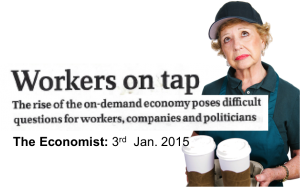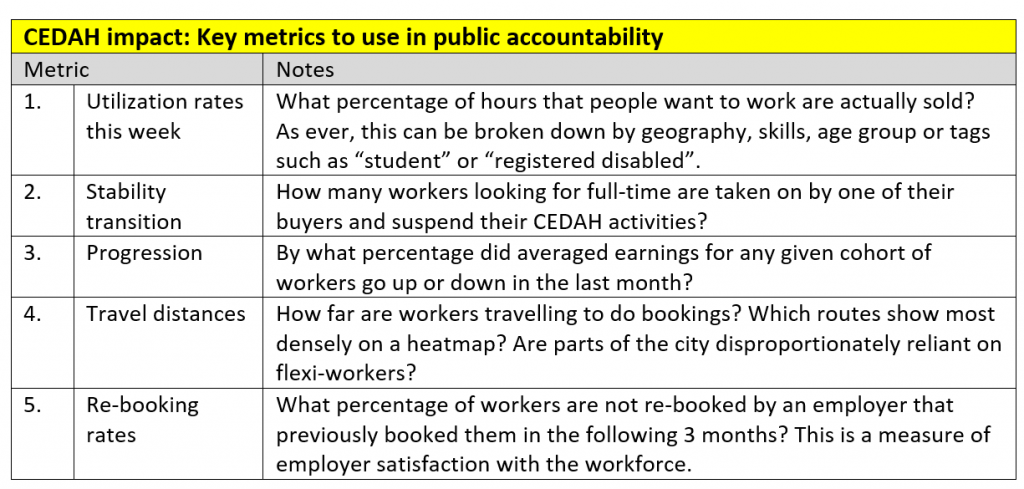[ezcol_2third] Balanced capitalism has been the most effective poverty-reduction tool ever. A CEDAH extends state-of-the-art markets to people who need them badly.
Balanced capitalism has been the most effective poverty-reduction tool ever. A CEDAH extends state-of-the-art markets to people who need them badly.
Five impacts of the CEDAH
- Participation rate: A CEDAH (Central Database of Available Hours) brings people in from the labor market fringes. There may be only a few hours available for work today with no certainty about tomorrow. But registering those hours in the CEDAH is effortless and starts a verifiable track record. There may not be work today; but the system could be set to then release reserved-demand next time as part of a government “guaranteed foothold on the work ladder” scheme.
- Average earnings: These rise partly as a result of increased options, and reduced switching costs, for workers. Secondary employment for usefully qualified, but lower paid, individuals is likely to also feature; teachers and nurses moonlighting as babysitters for instance.
- Employer attraction: A CEDAH offers incoming or start-up enterprises a turn-key workforce. It makes it constantly tempting to branch out with a new business. Home hairdressing for example. You have 3 clients this week who book you through the CEDAH. It then schedules what other work it can for you around them. Next week you may have more. It will do the same. And when it’s time to open a salon it will help you hire extra help exactly in line with need.
- Resilience: The CEDAH fosters workers with broad skills and self-reliance. In case of emergency it can be used to assemble specific skills possibly unpaid, each with a known set of tolerances and experience. (“We need 250 volunteers to search for a missing child. Please accept the role description and make yourself available in the CEDAH this weekend.”) If radical schemes like guaranteed minimum income or a parallel currency are ever called for, the CEDAH is an ideal platform for their immediate, secure, auditable, cost-effective, administration.
 Public services: Town planning, classroom teaching and traffic design all fit the model of regular work in a regular place; done entirely by people in jobs. But social work, legal casework, building repairs, environmental clean ups and other less predictable services may benefit from a pool of qualified top-up workers booked on their own terms as demand fluctuates.
Public services: Town planning, classroom teaching and traffic design all fit the model of regular work in a regular place; done entirely by people in jobs. But social work, legal casework, building repairs, environmental clean ups and other less predictable services may benefit from a pool of qualified top-up workers booked on their own terms as demand fluctuates.
Comparison: An integrated work market
The Mayor of Flexcity has committed to Full Spectrum Employment Support. Jobs are a crucial part of that of course. But she also believes “some work is better than none”; if a job is not possible, a citizen should be helped towards whatever work they can do to boost self-reliance. Embodying this vision in a comprehensive city-wide platform has allowed a range of services to integrate around the needs of each worker.
A full time job and irregular work are on a seamless continuum for many workers. Chances are, the CEDAH was involved in the appointment to a job through trial bookings. Worker records can then be ported to the employer’s HR system. If extra hours are ever needed the CEDAH record can be reactivated. But, even if they stop trading, the CEDAH is there with a range of services based on the record.
Most useful of these is innovative financial services. Competing providers might set up algorithms that crunch a CEDAH worker’s history of activity, utiliziation, adaptability to new skills and earnings to project future income. Coupled with analysis of their local market this enables insurance, holiday pay, cash flow balancing and other financial services to be tailored, each in return for a percentage of income diverted by the CEDAH. Products like this offer further inducement to maintain an attractive reliability record; doing what you say you will do each time.

Tradtown, focused on traditional models of employment alone, hasn’t escaped the trend to fragmented work. The current gig economy companies are jostling to enforce their business model for flexi-labor. Citizens operate much more in silos; one market for a particular type of work, another for aspirational tasks, a third for financial services, and so on. It’s time consuming, uncertain and costly to meet life’s needs. Flexcity has assumed it needs a joined-up modern labor market just as local ordinances were once used to ensure a coherent road network boosted the area economy.
Citizens in Flexcity can work outside the CEDAH through any other platform of course. Those platforms are welcome to use the CEDAH for local bookings, offering their own ratings, data and tools to add value on top of the basic service. But their chances of getting a monopolistic hold on a target sector with just a basic matching website in Flexcity are diminished. The CEDAH provides seller empowering matching across so many types of work.
The mayor’s account
The CEDAH itself is accountable to citizens. It is possible CEDAH data would be interpreted by local campaigners as avidly as Wall Street watchers parse movements in the Dow. They Mayor has a new tool for her priorities. But it doesn’t give her a free ride. 
A mayor comfortable with this kind of accountability could activate a range of triggers to tackle problems. Residents of a deprived neighborhood have unusually low Utilization Rates? Tell the CEDAH to prioritize those people for local government bookings to ensure they have a chance to prove themselves. Food handling skills in high supply but low demand? Could promoting a monthly eating-out event boost city restaurants? Companies keeping workers on short term CEDAH arrangements for regular patterns of bookings? Might be time for outreach stressing the economic case for an employment relationship. And so on.
Wisdom of jobs
Some points on the relationship between quality irregular work and jobs:
- Economics of jobs: If a need for work is predictable and in one place it is better value to appoint an employee. They do not carry the overheads of agency flexi-workers, they build organizational knowledge and relationships which boosts effectiveness and are vested in the employer’s success not their personal track record.
 Resource accessibility: Will instant access to by-the-hour headcount destroy jobs? Making flexible resources easily available has not had this effect elsewhere. It was once feared city bike schemes would kill cycle ownership. But public bike hire has expanded cycling to those with marginal need. The bulk of pedallers are regular and prefer to select their own – always available – machine. It’s hard to see any tool creating a desire for constant rotation to fill core staffing needs.
Resource accessibility: Will instant access to by-the-hour headcount destroy jobs? Making flexible resources easily available has not had this effect elsewhere. It was once feared city bike schemes would kill cycle ownership. But public bike hire has expanded cycling to those with marginal need. The bulk of pedallers are regular and prefer to select their own – always available – machine. It’s hard to see any tool creating a desire for constant rotation to fill core staffing needs.
- Enhanced employability: A CEDAH may change hiring by enabling a deep pool of reliable, accomplished, workers who can be instantly sifted against recruitment criteria. Filling a post is a lot less risky if a CEDAH is on hand.
- New business boost: It is young businesses that create the most jobs. The CEDAH allows citizens to experiment with starting a business endlessly.
It’s often overlooked, but many workers – particularly the young – want to work irregularly. At its worst a job involves standing at a hatch all day asking “do you want fries with that” on behalf of an organization that has negligible training, progression or security on offer. At its best, irregular work, on your own terms for a portfolio of buyers offers self-determination, resilience and excitement. Assuming everyone seeks a state of mono-skilled dependency on one organization may be outdated.
Post dated?
 The danger in a CEDAH launch may be under-utilized employees. Imagine a corporate print room has an assistant who alternates between rush jobs and periods of monastic calm in-between. She may be on a 35 hour week but only in action for 20 with corporate rigidity ensuring she is not shared across departments with flexible tasks that could fit around print runs. It is only the inefficiencies and overheads of booking agency print workers at short notice keeping her post alive. A CEDAH would remove those.
The danger in a CEDAH launch may be under-utilized employees. Imagine a corporate print room has an assistant who alternates between rush jobs and periods of monastic calm in-between. She may be on a 35 hour week but only in action for 20 with corporate rigidity ensuring she is not shared across departments with flexible tasks that could fit around print runs. It is only the inefficiencies and overheads of booking agency print workers at short notice keeping her post alive. A CEDAH would remove those.
Ultimately it is a political decision: widen the local labor market to bring in as many as possible or preserve inefficiencies to protect the beneficiaries? But formal employment is under pressure. Automation and offshoring will kill jobs. Fostering better irregular work seems one part of a logical response. Unpredictable tasks are challenging to automate. It is hard to offshore need for babysitting, gardening, cleaning and thousands of other local services at which a CEDAH excels.
Will demand in a frictionless market for irregular workers rise and fall with job creation? A likely scenario is that the trendlines will correlate but piecemeal bookings will uptick ahead of a rise in traditional jobs as employers start hiring tentatively. The same may be true on a down cycle: ad-hoc bookings will taper off after a fall in jobs because they enable more precise deployment with what spending power is available.
Who loses?
Where has the spend in Flexcity’s CEDAH come from?
- The gray economy: World Bank data sizes the shadow (untaxed, unregulated, cash-in-hand) activity in OECD countries as upwards from 8% of GDP. Some researchers see that growing fast. Analysis shows around 50% of that in a typical area is irregular work that would be legal if in the legitimate economy; services in the home, building, decorating and similar services.
- Unrealized demand: Imagine you run an office-fitting business. A project is running over; if you could get 6 qualified carpet layers this afternoon you would be back on track. The budget might be justifiable but the time/risks/overheads of finding them without a CEDAH are prohibitive. So that demand is currently lost.
- Less efficient markets: A residential care home may have a list of workers to be phoned when staff are sick, they are then payrolled legitimately. It avoids agency overheads and allows the home to retain its primary relationship with workers rather than an intermediary. But it’s a distraction for already busy duty managers.
Total overheads
The CEDAH competes against these dynamics on total overheads. It will price in tax and enforce all regulation. But those components of hourly cost are only one part of the equation for someone needing, say; promotions staff next Tuesday morning, Wednesday afternoon and Friday evening.
Full outlay for that booking will include:
- Time: A manager will often have to phone or message multiple agencies/individuals in search of available workers. They may go to several websites. Then they wait for responses. It’s a long way from one-click booking taken for granted elsewhere in the economy.
- Uncertainty: Some sites purport to offer instant booking of workers. Their algorithms assign the requirement to individuals but, in reality, those people may just not turn up. As these marketplaces come and go there’s little comeback from being downgraded for non-appearance if a worker changes their mind, they just move on to other markets.
- Quality: Occasionally, the outside world gets a glimpse of the churn rate in online labor markets. The rate at which workers leave these exchanges suggests low commitment to progression through their market.
- Intermediary charges: A recruitment agency might offer to find the staff needed for a fragmented requirement. But it’s probably going to involve phoning/texting/messaging by someone in the office; those costs have to be recouped.
- Risk of discovery: Off-the-books bookings do get detected, employers go to court. It’s part of the overall overheads of arranging contingent labor for the lowest possible cash cost.
 A CEDAH competes on convenience, reliability, motivation, process costs and legitimacy. It takes 20 seconds to book 10 promotions workers for the exact hours required. Each is working on their own terms, at times of their choosing and may not be leafleting for long. They are building a portfolio track record with roads into better work.
A CEDAH competes on convenience, reliability, motivation, process costs and legitimacy. It takes 20 seconds to book 10 promotions workers for the exact hours required. Each is working on their own terms, at times of their choosing and may not be leafleting for long. They are building a portfolio track record with roads into better work.
Of course, there will still be bookings through forums that chose not to work with the CEDAH. Shadow economy activity will continue, but it will be more exposed: clearly driven by a determination to break the rules rather than just book more conveniently than legitimate channels.
→ About
[/ezcol_2third] [ezcol_1third_end][/ezcol_1third_end]
